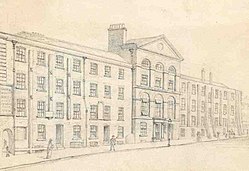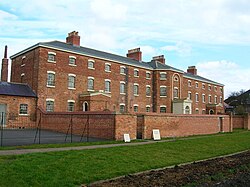
Historically in England and Wales, our ancestor's all had a parish of settlement. In times of need, it would be this parish that was responsible for their care, such as donations of clothing and fuel. Determing which parish was responsible was not always clear cut. This may be determined according to where a person was born, if they served there as a parish officer or if they completed their apprenticeship there. If a person required poor relief and their parish of settlement was not obvious, a settlement examination would be carried out and a settlement certificate issued. A removal order may be supplied demonstrating their requirement to leave a named parish. Many of our needy ancestors also required a stay in the workhouse. This may have been a short, temporary stay or a lengtheir period culminating with their deaths. Even our more financially comfortable ancestors may have found themselves in a time of need if they unexpectedly lost their job or lost their house suddenly in a fire. Other examples include records of pauper apprenticeship, vestry minutes and documentation regarding illegitimate births whom the parish officials feared having to pay for. A majority of poor law records, often referred to also as parish records, are held at local county archives, although not all have survived.
Research your ancestors on MyHeritage
Research your ancestors on MyHeritage
Settlement examinationsSettlement examinations
If it was not obvious which settlement a person belonged to and they were in a time of need, a settlement examination was carried out by Justices of the Peace. This involved discussing the person's life with them including any house moves and work history to determine which parish should be responsible for funding their care. A settlement examination gives the date it was carried out and the names of the person or people involved. This could include multiple children whose names and ages are usually supplied. A history of the family's house moves is given, including where their children were born, where they carried out their apprenticeship and where they have worked since. Any other information deemed relevant to the officials is also given, such as the parish of residence of the person's parents. Settlement examinations are sometimes referred to as pauper examinations.
Settlement certificatesSettlement certificates
When a person or family's parish of settlement was determined, a settlement certificate was created. The person could then retain this as proof that they could receive poor relief from the named parish. A certificate also enabled a person to move between parishes so long as they returned to their parish of settlement if they required poor relief. Settlement certificates name all of the family including children, sometimes the ages of those named and their parish of settlement. Churchwardens and overseers are also named on the document.
Removal ordersRemoval orders
A removal order was issued to a person to a family who was deemed to be in need of poor relief, or likely to become chargeable to the parish, such as an unmarried pregnant woman. This allowed parish officials to legally remove the person from their parish and into their rightful parish of settlement to receive aid. The churchwardens and overseers of the parish are also named, alongside those being removed. The family's names and ages are again given, usually with clarity over their relationship to each other e.g. Mary Marshall, John's daughter, aged eight years old'.
Records of bastardyRecords of bastardy

Documentation relating to illegitimate births are historically called records of bastardy. These include the following:
- Bastardy examinations- Parish officials (or Justices of the Peace) would interrogate pregnant mothers of illegitimate children and the mothers of recently born illegitimate babies in an attempt to discover who the father of her child was. This was an attempt by the parish to ensure the father of the child paid for its care rather than become chargeable to the parish. Witnesses were sometimes called to discuss the nature of the woman's known physical relationships.
- Bastardy bonds- If a reputed father of an illegitimate child was found, parish officials would request the man sign a bastardy bond. This was a legal document where the man pledged to pay for the child's maintenance, usually with weekly payments.
- Bastardy orders- If the reputed father denied that the child was his or refused to pay then a bastardy order could be created. This court issued document legally ensured the man paid for the child's care with the threat of punishment if he did not do so.
Pauper apprenticeship recordsPauper apprenticeship records
Children belonging to pauper families could be apprenticed into work by the order of parish officials against the wishes of the child's parents. They were often removed from the parish altogether, even from the age of 7 years old. An appreticeship indenture was created naming the apprenticed child, their Master and their Master's parish of residence where they would now reside. Their occupation was also stated, such as blacksmith or mason, however many pauper children were simply apprenticed to work in domestic service rather than given a trade.
Vestry minutesVestry minutes
The vestry of a parish consisted of the parish officials, normally lead by the incumbent. Vestry minutes were taken during meetings, often including notes regarding poor relief and the names of pauper children who have recently been apprenticed. The names of those attending the meeting are given, usually with their named position (i.e. churchwarden, constable). The level of detail given in the minutes varies, with some being very concise.
Workhouse recordsWorkhouse records

Parishes began to establish workhouses from the late 17th century. They were initially designed as a form of poor relief by creating labour for the poor of the parish. Over time they were developed to also care for the sick and elderly. After the Poor Law Amendment Act of 1834, parishes were rearranged into unions, resulting in the emergence of union workhouses. It is from this date that most surviving records date from, however the survival rate is patchy. There are is variety of documentation that you may uncover if your ancestor stayed in a workhouse including:
- Admission and discharge registers- These note the name and date of those entering and leaving the workhouse with extra information such as their age, marital status, parish of residence, occupation and reason for admission
- Birth registers- Workhouses held their own birth registers for births that occurred within the workhouse itself
- Death registers- Likewise, workhouses also held their own death registers for deaths that happened whilst a person was resident in the workhouse
- Infirmary records- The workhouses which contained infirmaries held their own registers for patients including the patient's name, age, their illness, treatment received and their dates of admission and discharge
- Board of Guardian minute books- The Board of Guardians held regular meetings regarding the daily occurences of the workhouse such as changes to diet, supply contracts, building repairs, staff appointments and changes to regulations. The meetings were often summarised in local newspapers
Other sources relating to the Poor Law in England and WalesOther sources relating to the Poor Law in England and Wales
In addition to the above you may find evidence regarding the Poor Law in the following sources:
- Quarter Sessions minute books- Where there was a dispute over a parish of settlement this may have been referred to Quarter Sessions
- Churchwarden's accounts- The churchwarden was responsible for keeping track of the incomings and outgoings of the parish's finance including donations of fuel and clothing to the poor. The name of the person receiving the relief is normally named, however only there surname may be provided e.g. Mr Marshall or Widow Smith
- Newspaper records- You can read about the changing legislature with regards to the Poor Law in newspaper articles as well as read about relevant noteworthy cases such as abuse in workhouses and pauper apprentice's who were declared as missing having deserted
See alsoSee also
Explore more about Poor Law records in England and WalesExplore more about Poor Law records in England and Wales
- Rich Resources for Poor Ancestors at Legacy Family Tree Webinars
- The People, the Places, the Life Behind Doors: the world of the workhouse (England and Wales) at Legacy Family Tree Webinars
- Begotten by Fornication: Illegitimacy records in England and Wales at Legacy Family Tree Webinars
- Research Guide: Workhouse inmates and staff at The National Archives
References


